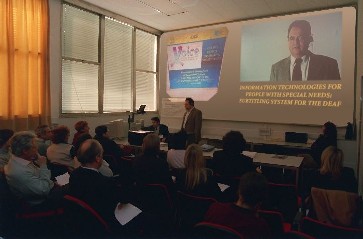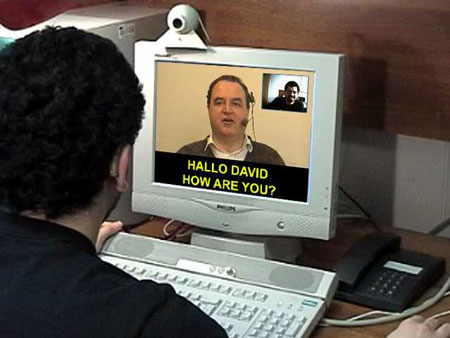
Conference's objectives
The Conference aims at spreading information on the potentialities of voice
recognition and voice synthesis techniques and in encouraging an awareness
rising process on the ways of helping people with disabilities.
The final objective is to contribute to protect weak categories of people:
those with disabilities, the elderly, the disadvantages and the immigrated,
underlining the obstacles, due to the communication problems.
Even if all agree on the importance of providing people with disabilities
with human and technical aids, the priority given to this aspect is very low.
Some of reasons are the lack of awareness of the problems, the need of translating
the user requirements into technical specifications, the achievement of a
large-scale view of the problems, the proposed solutions and the potential
market. All these factors should be considered at a European level, both on
technical and legal aspects.
In a design for all approach, all hardware/software tools should
be fully accessible to every one, regardless of his/her special needs. Taking
into account the diversity of special needs will ensure that the final products
will be of better normal use for every one.
One of the objectives is not only to make more accessible the existing systems,
but also to avoid that the new systems create additional barriers, thus increasing
(instead of reducing!) the number of people with disabilities.
Contents
The Conference will present the results achieved by the VOICE Project and
the Development and Harmonisation of Subtitling in European Television
Broadcasting Project and discuss new challenges.
The VOICE Project investigated the use of speech recognition systems in conversation,
conferences, television broadcasts and telephone calls. It developed prototypes
of user friendly interfaces allowing an easier use of commercial products
in translating the spoken voice into PC screen messages and subtitles. This
is a powerful help for people with hearing impairment, reducing the gap between
them and the hearing world.
The participants to a significant number of events organised by the VOICE
Project underlined the need of increased collaboration among the television
broadcasters in the development and harmonisation of subtitling in European
television broadcasting. Many television broadcasters, subtitling firms and
associations of users confirmed their interest in this area.
An initiative aiming at setting up the basis for such a collaboration and
at doing together the first steps in this direction started in the frame of
JRC Exploratory Research Programme, with the encouragent of several
EC Directorates General, and helped in creating the CENELEC Working Group
Television for All and in organising a Conference in Seville on June
2002.
In the European Year of People with Disabilities 2003, VOICE continues the
contacts with the television broadcasters and CENELEC, aimed at providing
techical support that may help in armonising subtitling in European television
broadcasting. It continues encouraging this awareness rising process and spreading
information on the first results.
Even if the Project starts with the aim of overcoming disabilities, it is
addressed to all users, thanks to a design for all approach. This
is particularly important in this period of Enlargement, with the need of
facilitating communication between a larger number of countries, taking into
account a larger number of languages.
During the Conference, the speakers will demonstrate the use of voice recognition
for generating subtitles of conferences and television broadcasts (for people
with hearing impairment), as well as the navigation on the Internet assisted
by voice recognition (for people with motor impairment) and by voice synthesis
(for people with visual impairment).
The television broadcasters will present their activities and plans in this
field. CENELEC will present the final report of the Group.
Participants, speakers and co-ordination
The Conference is addressed to experts of voice technologies, television
broadcasters, EC and local authorities, associations of people with disabilities,
more particularly those with hearing impairment.
A starting reference point will be the results achieved by JRC Exploratory
Research Project Development and harmonisation of subtitling in European
television broadcasting and by the CENELEC Group Television for All,
but we are looking forward to open, by this conference, new opportunities
of collaboration and of further activities.
We encourage the speakers, as well as the participants, to take an active
role and to present film-documents or on-line demonstrations.
The Conference's program is being co-ordinated with the organisers in Brussels
and Rome of other events of Year 2003, in order to ensure that the JRC events
will be in line with the other foreseen events. Both for this Conference,
for the IST Conference in Milan on the 4th October and for the European Year
2003 Bus passing in Varese on the 3rd November, JRC-Ispra is to be seen as
the obvious intersection of the European events organised by Brussels and
the Italian events organised by Rome, with a particular accent on the aspects
of European Research and disabilities.
Speakers on this topic also from Brussels and Rome are confirming their participation,
in view of reaching an harmonious series of final closing events.
The members of the InterService Group on Disabilities (ISGD), chaired by Directorate
General Employment and Social Affairs, encouraged the project and the Unit
Integration of People with Disabilities will be represented by Frank Marx.
The Normalisation Unit of the Directorate General Enterprise will be represented
by Antonio Conte and the RTD Health Research Unit by Olivier Le Dour. Also
in the Directorate General Information Society, the Unit for people with disabilities
confirmed their support.
Location
The Conference is organised by JRC Ispra and is held in the near Conference Centre Piero Mongini at Casa Don Guanella in Barza

A slide is projected on the left wall-screen by the speaker, who is speaking into a microphone connected to a PC: the text generated by the speech recognition system is converted into subtitling lines on the PC screen and projected on the right wall-screen, under the speakers image taken by a video-camera

Videoconference system with automatic live subtitling. A deaf user communicates with a colleague speaking to a microphone connected to a PC: the text generated by the speech recognition system is converted into subtitling lines and overlaid onto the correspondent's video image. The subtitling prototype is developed in several languages.